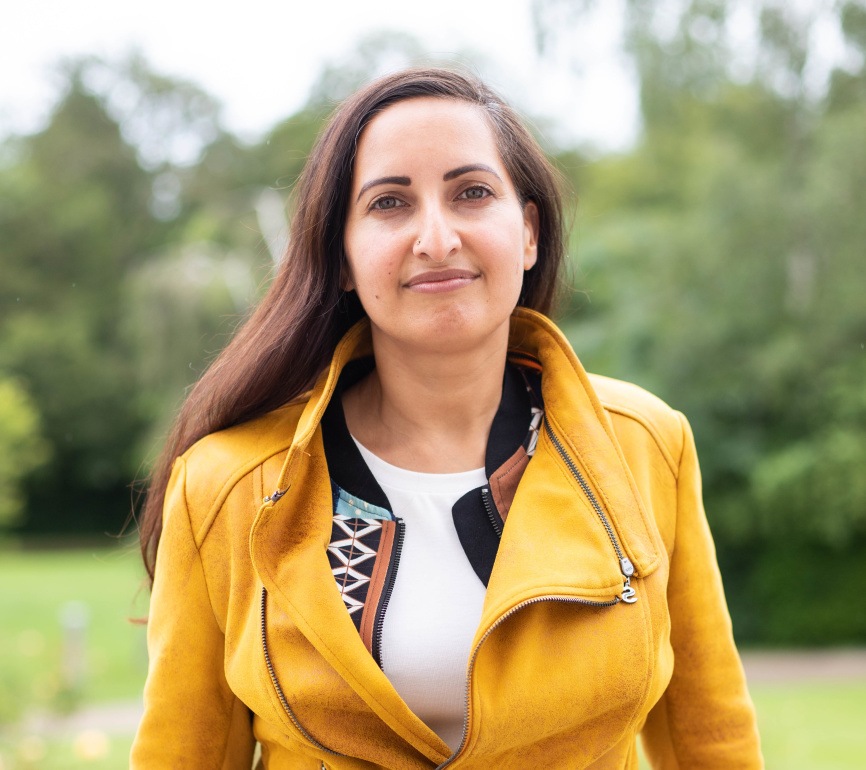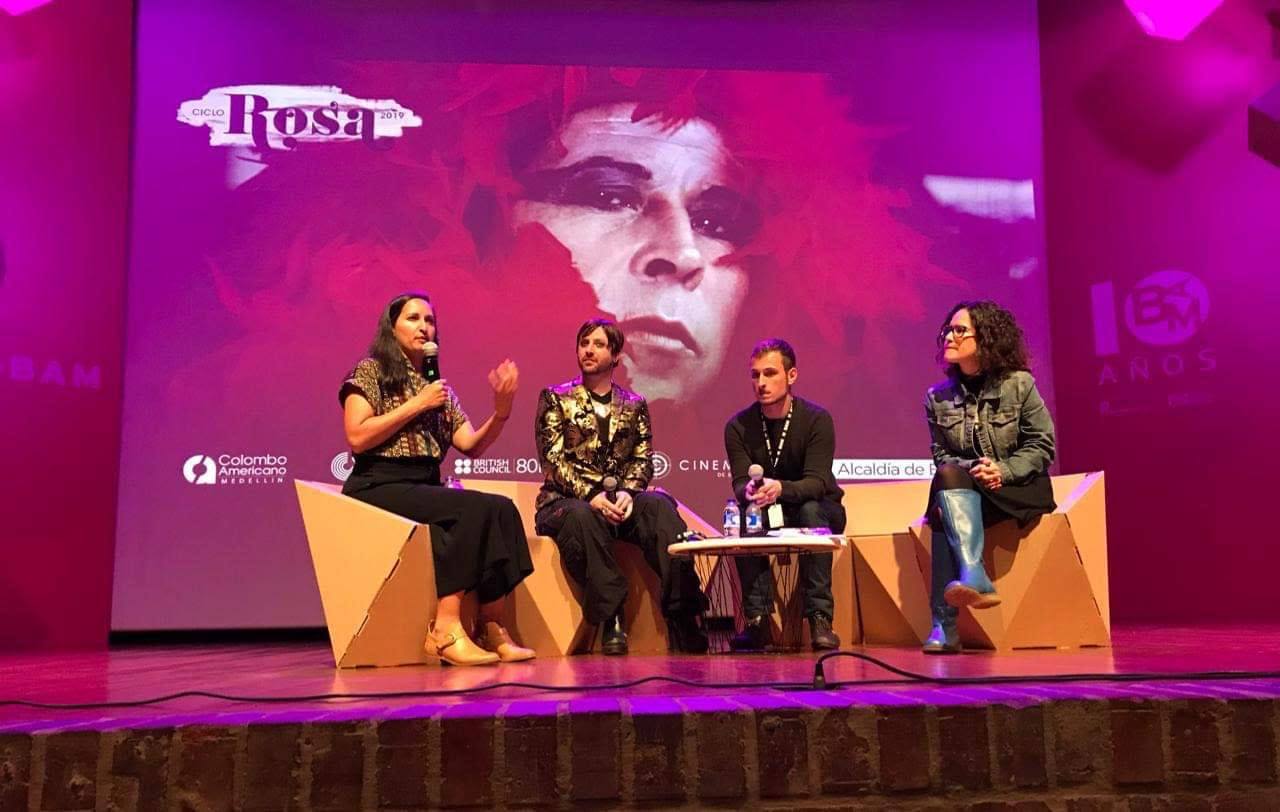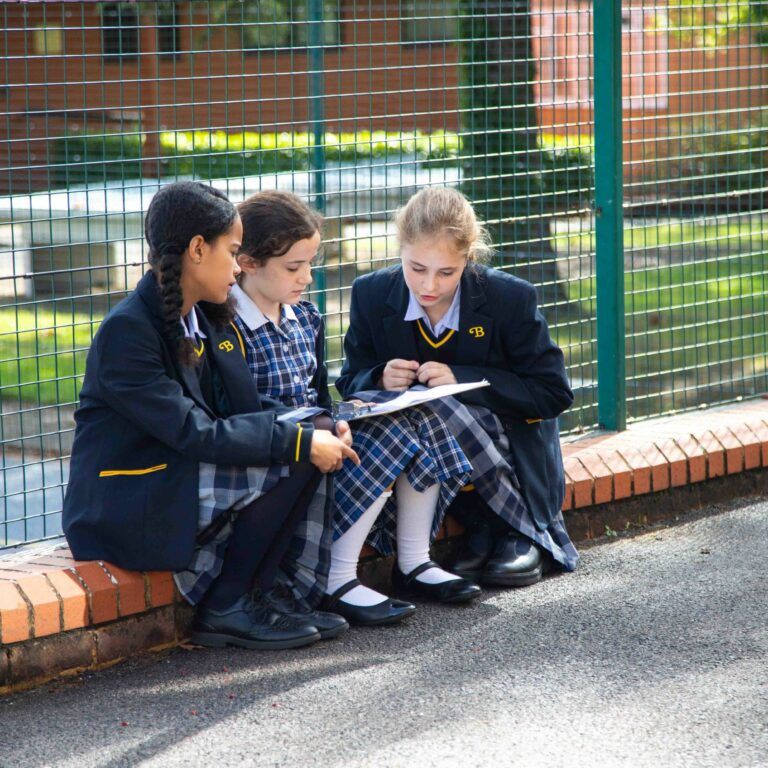Over the summer we had the opportunity to catch-up with Bold Girl Lucy Mukerjee, who was visiting the area from her home in New York. We managed to grab a photo and learn about her career as a producer and film curator in the US.

Tell us about your time at Burgess Hill Girls
I was at the school from 1986 to 1994, along with my sister Emma who is three years younger. Before starting the new term, we did two weeks of Summer school at Burgess Hill Girls to get us acclimatized. I have vivid memories of sitting in the art room at age 7, happily painting and crafting, while the very fashionable sixth formers in charge sung along to the radio. The soundtrack of that Summer (Madonna, T’Pau, Bananarama etc) is imprinted on my brain forever. It was challenging to leave the school at such a vulnerable age, but my parents were under too much financial pressure to be able to keep us there. I recently reconnected with some dear friends from my time at Burgess Hill Girls and being back in each other’s lives after so long has been a source of immense comfort. It was only after I left that I appreciated how stable and secure that environment had been. I genuinely missed that structure after I went out into the “real world”.
Was it nice to revisit the school after so much time away?
When I revisited the school recently, I found myself getting quite emotional when I arrived on the grounds. The first thing I saw was the memorial garden and it took me back to when my friends and I spent time there reading about the former students. The reverence I still had for that particular spot took me by surprise.
Walking around the school, I was impressed by how the layout was almost exactly as I remembered it, but also how modernized and well equipped it is. Seeing the Prep and Senior school halls filled me with so many memories. I was transported back to school assemblies and plays, fashion shows and talent shows. I also had vivid flashbacks seeing the classroom where I learned how to tell the time, the textile room (which still had the same familiar scent!) where I’d spent hours struggling to learn to sew, and the music room where my friends and I crafted many compositions on the keyboard. Seeing the path leading down the hill to the school gate was strangely nostalgic. It was very meaningful to be able to retrace the steps of my younger self. It’s really encouraging to see that today’s LGBTQ+ students have a voice through Prism, and that there is a gym and a wellbeing lounge. It made me a little envious of the students there now!
How did you get into film?
I grew up consuming as many films as I could. I had quite a strict upbringing but I would sneak downstairs after my family had gone to bed and watch whatever films I could find on TV. I realize in retrospect that I was searching for myself onscreen. I was hungry for representation of the LGBTQ community and of my Indian heritage, and was craving films made by and about queer brown females. Unfortunately there was very little of that being made in the 80s and 90s. What I did find instead were movies about identity and belonging, films that had messages about otherness coded into their subtext, most often from the perspective of cisgender white men. Those late night movie sessions were my self-led film school. I would save quotes from my favorite scenes to keep me inspired, collecting scraps of validation here and there.
My appetite for cinema continued to grow, and there were some happy twists of fate that led me to understand that it could be a career. When I was at Sixth Form College and suffering through my French A levels, the only thing that kept me interested was my teacher’s fixation on the French director Luc Besson. Her insistence that we study his early work gave me an understanding of how to analyze the different elements of a film – to consider the script, the cinematography, the performances, the lighting, the sound etc. When I got to university, on registration day I was told I had to pick a subject to minor in alongside my English Literature degree. Put on the spot, I had to make a decision, and Film Studies was the only logical option. I had a brief stint as a film critic for the Brunel University magazine, and then by chance I came across a book that outlined how to write script evaluations for the film industry. That’s when a lightbulb went off and I realized I could eat and breathe film for a living. After I graduated from Brunel, I got a job in publishing but film was still calling me. I felt the instinct to look for opportunities beyond the UK and being open to that really set me on the path to my career.
How did you end up in the US?
My sister and I grew up quite obsessed with the US as our Dad went there a few times on work trips and would come back telling us all about it. He even bought us back American flags which Emma and I hung proudly in our bedrooms. My Dad passed away in ‘97, the same year I started university, but my Aunt likes to say he left me signposts telling me where to go after I graduated. I knew I wanted to work in the film industry and since I didn’t have any luck getting interviews in London, I posted letters to ten different American production companies introducing myself and requesting an internship. One of them said yes, and by 2003 I was interning for an Academy Award-winning producer in Beverly Hills. That job led to another and over ten years I worked my way up the ladder from Producer’s Assistant to being a Producer in my own right. I produced feature films for Warner Bros and Lionsgate before pivoting to the film festival world to work as a film curator.
What does a film curator do?
I can only speak to my experience which has been curating for film festivals, but the role exists also in museums, schools, libraries, etc. A film curator’s mission depends on the context of who you are curating for, as you’re working with a specific audience in mind. When I was the Director of Programming at the Outfest Film Festival, we showcased about 200 films a year, all of which were centered on LGBTQ+ lead characters. In that context, upbeat content and positive representation of the queer and trans community was a priority. The Tribeca Festival, where I work now, has a wider reach than an identity-specific festival; it serves the residents of New York, as well as being a pipeline of new content for US film industry. Tribeca is known for its track record of discovering fresh, noteworthy talent so when my colleagues and I are reviewing the 10,000+ film submissions each year, we’re looking for unique and memorable work. The programming team’s goals are to world premiere films that will entertain an audience, be appreciated by film critics and be acquired for distribution all over the world. Pre-pandemic, my team and I would travel the world visiting other festivals, film markets and funding organizations to watch works in progress. I’ve traveled to Berlin, Bogota, Busan, Cartagena, Doha, Dublin and Toronto in order to expand my network of filmmaker relationships beyond North America.
Regardless of who I’m curating for, my guiding principles remain the same. My approach is always to advocate for underrepresented filmmakers, and push forward a multiplicity of perspectives so that each year the festival lineup feels increasingly relevant and inclusive. Ideally anyone attending a festival should be able to find a film that speaks to their experience. Programming with a focus on equity and inclusion is an ongoing process; it’s not something you could ever say is 100% accomplished, but there are triumphs each year that keep me motivated to continue this work. Some highlights from Tribeca’s 2021 program are Geeta Malik’s India’s Sweets And Spices, Lauren Hadaway’s The Novice, Josef Wladyka’s Catch The Fair One, and on the documentary side, Madsen Minax’s North By Current and Vivian Kleiman’s No Straight Lines: The Rise Of Queer Comics.
A film curator’s day to day experience veers from very solitary to very public, depending on whether it’s programming season or time for the event itself. It’s unusual for one job to encompass such opposite skillsets. As a Senior Programmer at Tribeca, I’ll be watching festival submissions from October to March and writing evaluations to articulate why I feel the film should or should not be programmed. I also oversee the International Programming Committee, so I’ll run weekly check in meetings to see what the team recommend for me to watch next. Once the selections are made and the lineup is locked, I’ll write program notes for the printed film guide and festival website. And then in June I’ll be onstage with mic in hand, introducing the films and facilitating conversations between filmmakers and audience members. Because these are World Premieres, this will be the first time the filmmaker is seeing an audience react to their work and the dialogue that follows can be very powerful. This is the part of the work that I find most satisfying; to initiate conversations about the themes and messages that have resonated with viewers, and to tie that back to why the filmmaker was driven to tell this particular story.
It’s worth mentioning the reality that many film curators have very little job security. There are few full time jobs in this field so you’re often working for multiple organizations, juggling several gigs throughout the year. It’s also not a particularly diverse profession which means that there are major blind spots when it comes to what does and doesn’t get programmed. The lack of equity and inclusion in the leadership of the top tier festivals led some friends and I to start a coalition called the Programmers Of Colour Collective. It’s a professional development group for film curators who identify as Black, Indigenous and People of Colour. We currently have 300 members all over the world and we’ve found great success sharing job opportunities, ideas and advice with one another. We will be launching an online member directory as soon as we get funding so that festival heads will know where to find experienced film curators of colour. Our goal is to make the film festival landscape more inclusive – both onscreen and onstaff.
Is the Tribeca Festival as cool as it sounds?
Yes! Tribeca a huge festival with a footprint that goes well beyond cinema, to include live concerts, immersive content, games, podcasts, panels, and masterclasses as well. This year the screenings were outdoors in different neighborhoods across all five boroughs of New York City and they were free. Over the 11 days of the festival you can see about 100 feature length films and 50 shorts, curated out of 10,000+ submissions. Attending a festival can be a transformative experience because you’re immersed in art, and in community, and you get to hear from new perspectives that you might not otherwise have encountered. I’ve found that the best festivals get me out of the echo chamber of the opinions and ideas of the people around me, so that I return home feeling inspired and energized.
Can you tell us a bit more about your LGBTQ Activism?
My activism is rooted in my identity and comes in the form of fighting for positive representation. After spending a lifetime looking for myself onscreen, I have made it my personal mission to help create access and visibility for queer and trans creators of colour in film and TV. There’s a very clear throughline that leads from not seeing yourself represented to not believing that you have a future. I work to break down the barriers that have historically prevented LGBTQ+ storytellers from accessing the funding to create content and have sustainable, successful careers in the arts. I’ve made it my responsibility to be a gate-opener and that means identifying who’s missing from every environment I’m a part of – a team of staff, a panel of experts, a slate of films – and find ways to invite those voices in. I recently led some interviews for a LGBTQ+ oral history archive in the US, a job that I took specifically because the leadership was intentional about inclusion. If you look back at LGBTQ+ history, it is predominately white, male and cisgender, so it was vital for me to help reverse that erasure.

I recently finished consulting for a US TV channel that have made a public commitment to diversifying the directors that worked on their series. Female and non-binary creators who had a background in directing film, commercials, branded content and music videos but hadn’t been able to break into directing for television were invited to apply. I oversaw the selection process and we narrowed down the candidates to a shortlist of recommendations. Now a dozen LGBTQ+ and BIPOC individuals who weren’t on the channel’s radar before are going in to meet with the executives and three of them will get hired to direct episodes. This was an exciting project for me because it wasn’t about mentorship or training, it was rooted in the acknowledgment that experienced individuals who can do the job have been unfairly excluded from this field, and now its time to invite them in and get them hired. More and more institutions are facing their biases and changing their perception of who makes a qualified candidate. I’m finding myself increasingly drawn to doing consulting work like this, because there is so much need for change in this industry, and it’s so satisfying to see the impact of positive disruption to the way things have always been done.
Any Tips for Students Who Want To Study Or Work in The US?
The US is vast, so there are professional opportunities there that are more easily accessible than in the UK. But I wouldn’t limit yourself to the US. Spending time anywhere overseas is also a great way to explore who you are and find your tribe. Once I arrived in Los Angeles, I signed up as a volunteer at the Outfest LGBTQ Film Festival and the Indian Film Festival and that’s where I found my circle of friends.
For most people when you’re still in school it’s very difficult to think about choosing a career to commit to for the rest of your life. I would recommend taking the time to identify the things you enjoy and that make you happy, and then looking into what careers exist in those areas. One way of figuring this out is asking yourself, how would you choose to spend your time if you didn’t need to earn a living? What are the things you would still do even if you didn’t get paid for it? These questions might help you to zero into your purpose. If you don’t do this now, you might find yourself on a path that doesn’t feel fulfilling, and you’ll have to redirect yourself back to what brings you joy later in life.
Before you travel it’s important that you write down your values and goals and revisit them frequently to make sure you’re on track. It’s risky to be marooned overseas without a compass, because you can be taken advantage of. If you know why you’re there and what you want then nobody will be able to talk you out of it. You’ll be surrounded by all new people, some could stay in your life for many years, some will disappear just as quickly as they arrived. You won’t be able to distinguish one from the other in the moment, only time will tell. So keep your set of guiding principles close and refer to them whenever making a big decision.
For me, the pandemic has had an unexpected impact on my work that has led to some self reflection. When the Tribeca office shut down in March of 2019, I realized I didn’t need to be in New York or in any city for that matter. Since then I’ve been able to work remotely, as I’m not tied to a specific location and luckily can do what I do from anywhere. I’ve been able to focus on my own health and wellness and have made the decision that I won’t be returning to an office, so any future professional commitments will have to be remote. I’m going to use my time to prioritize the things that bring me peace of mind and satisfaction. After 20 years of putting my bosses’ needs first, that’s a lesson I wish I’d learned sooner.



